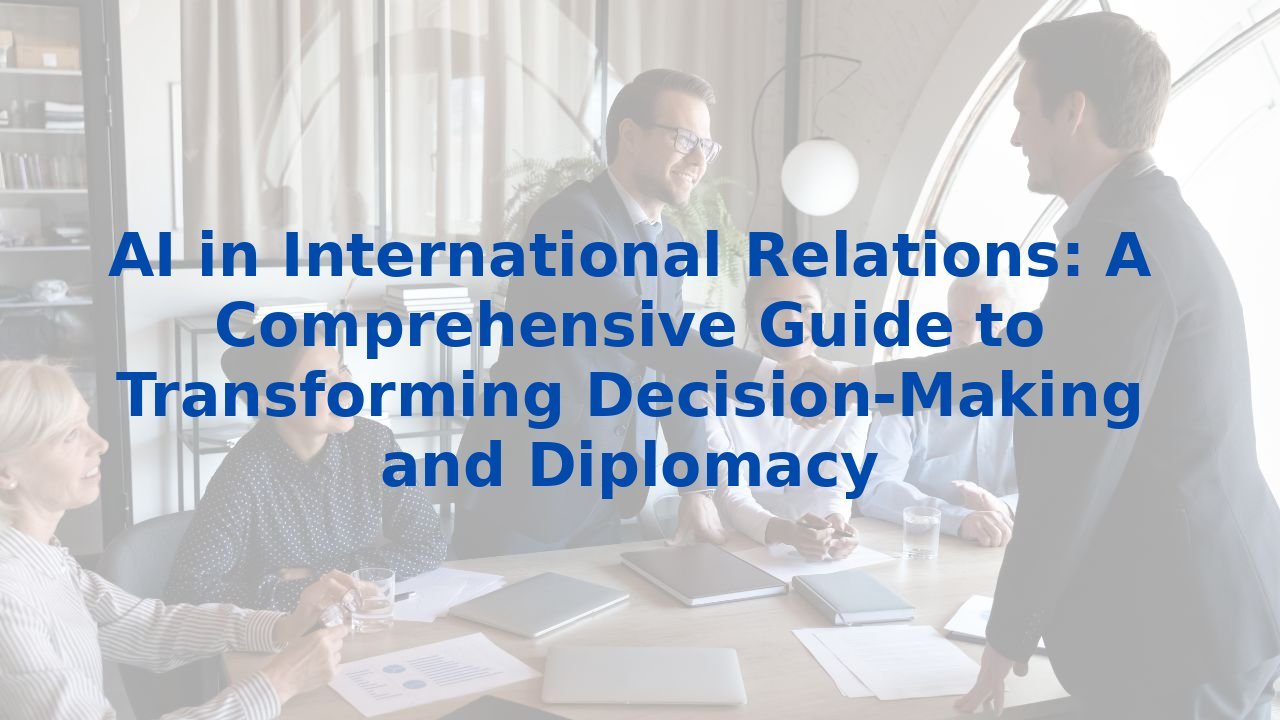AI in International Relations: A Comprehensive Guide to Transforming Decision-Making and Diplomacy
AI in International Relations: A Comprehensive Guide to Transforming Decision-Making and Diplomacy
Artificial intelligence (AI) is revolutionizing the realm of international relations by reshaping how we approach decision-making and diplomacy. With the evolution of machine learning, big data analysis, and advanced computational capabilities, organizations can leverage AI not just as a tool, but as an essential partner in crafting effective international strategies.
Enhancing Decision-Making Processes
In the intricate landscape of diplomacy, decision-making can often feel overwhelming. The sheer volume of information available can lead to analysis paralysis. Here, AI emerges as a powerful ally. By efficiently processing vast datasets, AI can help analysts and diplomats respond to geopolitical complexities with greater agility. Imagine having the ability to sift through historical data, current events, and predictive models all at once; this level of insight can significantly elevate the decision-making process, allowing leaders to act with confidence and clarity.
Data Analysis and Predictive Roles
The capability of AI to analyze data extends to monitoring compliance with international agreements and evaluating the effectiveness of diplomatic tools. By forecasting potential actions and strategies of counterparts, AI helps policymakers anticipate challenges before they arise. This predictive edge enables a more proactive rather than reactive stance, fostering an environment where well-informed decisions are the norm rather than the exception.
AI as a Tool for Diplomacy
AI’s impact on diplomatic activities cannot be overstated. It aids in streamlining operations, from drafting speeches to analyzing key trends in international affairs. For instance, by engaging in trend analysis and language translation, AI encourages clearer communication among diplomatic representatives from diverse backgrounds. This multilingual support can bridge gaps that often hinder negotiations and foster stronger partnerships.
AI isn't just transforming how we communicate; it's redefining the very essence of diplomacy.
Challenges and Opportunities
Despite its many advantages, embracing AI in international relations comes with challenges. The "global digital gap" is a genuine concern, as disparities in access to AI technologies could exacerbate existing inequalities among nations. Furthermore, the race for AI supremacy poses ethical questions, particularly in regard to how such technologies are deployed in global politics. Addressing these challenges is vital to prevent misuse and ensure a level playing field in the geopolitical arena.
Managing AI's Impact
To effectively integrate AI into diplomatic practices, organizations must adopt comprehensive strategies. This involves establishing robust national AI initiatives while prioritizing accountability in AI decision-making processes. By emphasizing ethical frameworks and human rights considerations, negotiators can foster trust in AI systems and mitigate potential backlash from other nations.
The Importance of Employee Training for AI
While the potential of AI is vast, harnessing that potential requires an empowered workforce. Training employees to work with AI tools and interpret AI-driven insights is fundamental to maximizing efficiency and enhancing decision-making capabilities. This training not only prepares staff to engage with advanced technologies but also promotes a culture of curiosity and innovation within the organization. Investing in comprehensive employee training programs can turn workers into competent AI partners, driving collective success in navigating the complexities of international relations.
Conclusion
AI represents a transformative force in political science and international relations, enhancing decision-making processes, facilitating data analysis, and fostering predictive capabilities. While it brings challenges that require careful management, the keys to success lie in awareness, responsibility, and embracing the transformative potential of AI within diplomatic practices. By prioritizing training programs that equip employees with the skills they need, organizations can harness AI to improve both their efficiency and effectiveness in international relations.
In the rapidly evolving landscape of global diplomacy, the integration of AI is not merely advantageous; it is essential. The future belongs to those who adapt, educate, and innovate. The way forward involves not just utilizing technology but also nurturing a mindset that welcomes change and seeks continuous improvement.



